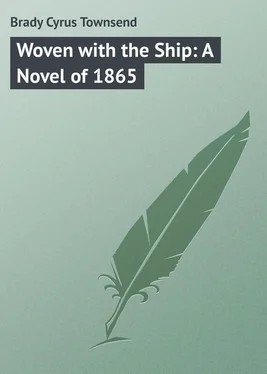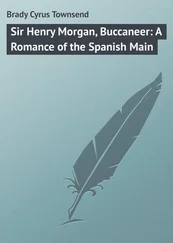Cyrus Brady - Woven with the Ship - A Novel of 1865
Здесь есть возможность читать онлайн «Cyrus Brady - Woven with the Ship - A Novel of 1865» — ознакомительный отрывок электронной книги совершенно бесплатно, а после прочтения отрывка купить полную версию. В некоторых случаях можно слушать аудио, скачать через торрент в формате fb2 и присутствует краткое содержание. Жанр: foreign_language, foreign_prose, на английском языке. Описание произведения, (предисловие) а так же отзывы посетителей доступны на портале библиотеки ЛибКат.
- Название:Woven with the Ship: A Novel of 1865
- Автор:
- Жанр:
- Год:неизвестен
- ISBN:нет данных
- Рейтинг книги:3 / 5. Голосов: 1
-
Избранное:Добавить в избранное
- Отзывы:
-
Ваша оценка:
- 60
- 1
- 2
- 3
- 4
- 5
Woven with the Ship: A Novel of 1865: краткое содержание, описание и аннотация
Предлагаем к чтению аннотацию, описание, краткое содержание или предисловие (зависит от того, что написал сам автор книги «Woven with the Ship: A Novel of 1865»). Если вы не нашли необходимую информацию о книге — напишите в комментариях, мы постараемся отыскать её.
Woven with the Ship: A Novel of 1865 — читать онлайн ознакомительный отрывок
Ниже представлен текст книги, разбитый по страницам. Система сохранения места последней прочитанной страницы, позволяет с удобством читать онлайн бесплатно книгу «Woven with the Ship: A Novel of 1865», без необходимости каждый раз заново искать на чём Вы остановились. Поставьте закладку, и сможете в любой момент перейти на страницу, на которой закончили чтение.
Интервал:
Закладка:
Some twenty-five years since a quaint old naval officer had taken up his abode at the house on the hill. With him had come a young sailor, who, disdaining the house, had slung his hammock aboard the ship, – finding a place between decks which, after a few repairs, would shelter him from the storms. When the old officer came, he hoisted at the mast which was at once erected in the yard the broad blue pennant of a commodore, and it was only after Farragut had made his splendid passage up the Mississippi, and awakened the quiet shores of the Father of Waters with the thunder of his guns, so that the title of commodore became too small for him, that the old veteran had been promoted with other veterans – and with Farragut himself – to the rank of rear-admiral, recently established, – certainly a rank entirely in consonance with his merit at least.
The old man had been practically forgotten, lost sight of, in the glory accruing to the newer names among the Civil War heroes; yet he had been among the foremost in that great galaxy of sailors who had made the navy of the United States so formidable in the War of 1812.
Old men of the town, whose memories as children ran back beyond even the life of the ship, recalled having seen, in those busy, unforgotten days of 1814-15, many uniforms like to the quaint old dress which the admiral sometimes wore on occasions of ceremony; and there were some yet living who remembered the day when the news came that the mighty Constitution had added to her record the last and most brilliant of her victories in the capture of the frigates Cyane and Levant . The man who had made the capture – who, when his wife had asked him to bring her a British frigate for a present when he set forth upon the cruise, had answered that he would bring her two, and who had done it – was the man who had been stationed in the white house on the hill to watch over the old ship.
The battles and storms, the trials and cares, the sorrows and troubles of eighty-five years had beat upon that white head; and though he was now bent and broken, though he tottered as he paced up and down the porch after the habit of the quarter-deck, though his eye was dim indeed and his natural force greatly abated, he was still master of himself. When the Civil War broke out his brave old soul had yearned to be upon a heaving deck once more, he had craved to hear the roar of guns from the mighty batteries beneath his feet, to feel again the kiss of the salt wind upon his tanned and weather-beaten cheek. He had longed in the deadly struggle of '61-'65 to strike another blow for the old flag he had done so much to make formidable and respected on the sea; but it was not to be. Superannuated, old, laid up in ordinary, he quietly watched over the rotting ship which was his last command.
In some strange way, with a sailor's superstition, as the years had passed, as he had grown feebler and the ship had grown older, he bound up his own term of life with that of the vessel. While it stood he should live, when it fell should come his end. He watched and waited.
When the night threatened to be wild and stormy, the report of the evening gun with which Captain Barry invariably saluted the flag ere he struck it would seem to him the sounding of his death-knell. When the tempest howled around the old house, he could hear, in fancy, above its wild screaming the crashing of the timbers of the ship falling in shapeless ruins on the mouldering ways. In the morning, after such a night, he would rise and creep to the door, totter out on the porch with the aid of his cane, and peer down on the ship. Some portion of it might have been swept away, perhaps, but if it still stood he would feel that he had a respite for another day.
Many a tall vessel had he commanded, many a gallant frigate or great ship-of-the-line he had driven through the tempestuous seas. Upon some of them, as on the Constitution , he had won eternal fame, yet never had he loved a vessel as his heart had gone out to the rotting mass of this incompleted ship.
He did not dream, when he came there twenty-five years before – an old man then – that either he or the ship would last so long; yet there they both stood; older, weaker, feebler, more broken, and breaking with every passing hour, but still a ship and still a captain.
During the years of their association the admiral had unconsciously invested the ship with a personality of its own. It seemed human to him. He dreamed about it when he slept. He was never so happy as when awake he sat and watched it. He talked to it like a friend when they were alone. Sometimes he reached his old trembling hand out to it in a caressing gesture. He had long since grown too feeble to go down to it; he could only look upon it from afar. Yet he understood its longing, its dissatisfaction, its despair. A certain sympathy grew up between them. He loved it as it had been a woman. He would fain have kissed its keel.
Yet the devotion the admiral felt for the ship was scarcely greater than that which had sprung up in the heart of the old sailor who lived aboard it.
Old John Barry had been a quartermaster on the Constitution , and had followed the fortunes of his captain from ship to ship, from shore to shore, until he died. After that the duty of looking after the captain devolved upon his son, young John Barry; and when the commodore had been ordered to Ship House Point, more with the intention of providing him with a congenial home for his declining years than for any other purpose, young John Barry had followed him.
Young John Barry he was no longer. He was fifty years old now, and, like the admiral, had unconsciously made the life of the ship stand for his own life as well. The witchery of disappointment and regret, pregnant in every timber, bore hard upon him also. He had been a gay, dashing, buoyant, happy-go-lucky jack-tar in his day; but, living alone on that great old ship, some of the melancholy, some of the dissatisfaction, some of the longing, some of the futile desire which fairly reeked from every plank had entered his own rough and rugged soul.
The bitter wind had sung through the timbers of the ship too many tales of might-have-been, as he lay in his hammock night after night, not to have left its impression upon him. He became a silent, taciturn, grave old man. Of huge bulk and massive build, his appearance suggested the ship-of-the-line, – strength in age, power in decay. He loved the ship in his way even as the admiral did.
Risking his life in the process, he climbed all over it, marking with skilful eyes and pained heart the slow process of disintegration. He did not kiss it, – kisses were foreign to his nature, he knew nothing of them, – but he laid his great hands caressingly upon the giant frames, he pressed his cheek against the mighty prow, he stretched himself with open arms upon the bleaching deck, as if he would embrace the ship.
When the storms beat upon it in the night, he sometimes made his way forward and stood upon the forecastle fronting the gale, and as the wind swept over him and the ship quivered and shook and vibrated under the tempestuous attack, he fancied that he felt the deck heave as it might under the motion of the uptossed wave.
He dreamed that the ship quivered in the long rush of the salt seas. Then the rain beat upon him unheeded. Wrapped in his great-coat in winter, he even disdained the driving snow, and as he stood by the weather cathead, from which no anchor had ever depended, and peered out into the whirling darkness, he seemed to hear the roar of a breaker ahead!
The ship was his own, his property. The loss of a single plank, the giving way of a single bolt, was like the loss of a part of himself. With it he lived, with it he would die. Alone he passed his nights in the hollow of that echo of the past. Sometimes he felt half mad in the rotting vessel; yet nothing could have separated him from the ship.
Читать дальшеИнтервал:
Закладка:
Похожие книги на «Woven with the Ship: A Novel of 1865»
Представляем Вашему вниманию похожие книги на «Woven with the Ship: A Novel of 1865» списком для выбора. Мы отобрали схожую по названию и смыслу литературу в надежде предоставить читателям больше вариантов отыскать новые, интересные, ещё непрочитанные произведения.
Обсуждение, отзывы о книге «Woven with the Ship: A Novel of 1865» и просто собственные мнения читателей. Оставьте ваши комментарии, напишите, что Вы думаете о произведении, его смысле или главных героях. Укажите что конкретно понравилось, а что нет, и почему Вы так считаете.












